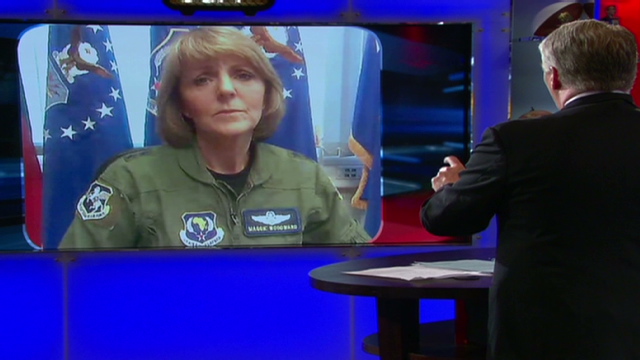Maj. Gen. Woodward talks to John King
CNN’s John King interviewed the first woman in U.S. history to oversee an air campaign Maj. Gen. Margaret Woodward on her historic role and on the NATO mission in Libya. This interview will air tonight on John King, USA – 7pm ET. A highlight and a video link from the interview are after the jump. Please visit CNN.com for the full transcript.
MANDATORY CREDIT: JOHN KING, USA
HIGHLIGHT FROM FULL INTERVIEW
THIS IS A RUSH FDCH TRANSCRIPT. THIS COPY MAY NOT BE IN ITS FINAL FORM AND MAY BE UPDATED.
JOHN KING, HOST, “JOHN KING USA”: The regular participation by the United States has now been dialed back, which takes the A-10, the AC-130 out of the theater, at least for now. What suffers as a result? Those are two aircraft that can fly in low. They are known as very punishing if they pick out a target and go on the attack. Do other coalition partners have anything comparable?
MAJ. GEN. MARGARET WOODWARD: No, John. But I think if you look at the results, all of our different fighters, both U.S. and coalition assets have had, I think that you’ll find that across the board, they’ve all been very effective at taking out the assets and hitting the deliberate and dynamic targets that we’ve given them. So I think to focus on a couple specific fighter platforms, honestly, in my opinion, is — is off base. I think you have the assets you need to do the job.
KING: And so then let me take the particular assets out of the equation. Now, you — do you see any differences in terms of the capabilities now that the United States is in a secondary or back seat role?
WOODWARD: Well, obviously, you don’t have the same — the same fighter forces in there right now. But I see the NATO further forces as — as capable to be able to do the job. And I think, as you watch them through these days, today and beyond, you’ll see that they’re just as effective.
KING: Take me to the first day of this operation. You are given the command to implement this no-fly zone. You’re the first woman to command a U.S. combat flight mission. How much does that factor into your mind what I’m sure you’re most concerned about, do I have what I need, am I implementing it the way I need to do it? But how much did the history kick into your day?
WOODWARD: I can pretty much guarantee it, John, that it didn’t — it didn’t even cross any of our minds. All of us were working as hard as we could. As you know, it — it came down pretty quickly. And we were — we were scrambling pretty hard to — to make sure that we had everything in line so that we would execute this as well as we possibly could. And we really weren’t thinking about anything else except to make sure we got our strategy right and that we had our — our execution well in line.
KING: How about now that we’ve moved into the next phase and you have a little time to reflect? And I ask in the context of — you know it better than I do — when you first came into the Air Force, you were not allowed to do certain things. You were allowed to fly trainer planes, but you were allowed to train pilots, but you couldn’t fly in combat. You said that in 2005, to “The Tampa Tribune,” “I was still smarting under the fact that I couldn’t go fly a fighter and women couldn’t fly in combat.” How — how significant is what has happened to you in recent days, do you think, to the evolution of the role of women in the military?
WOODWARD: Well, and I — I’m glad you put it as evolution, because, John, if you think about it, it has been an evolution. And I remember in my early days thanking the — the women who came before me, the women who flew in World War II and made it possible and made it clear that women could fly. And — and I’d like to think that the things that we did in the early days, in my generation, made it possible for the women who are flying fighters today.
And I can honestly tell you that there has been no gender separation that I have felt throughout my career. We, in the U.S. military, are very gender neutral, if you want to put it that way. And I — I feel like I haven’t lost any opportunities because I’m a woman. And I honestly think when I operate, there’s nobody that looks at me and says, that’s a female leader. I think everybody says, that’s a leader. And everybody that I work with, you know, we feel the same way about each other.
###
